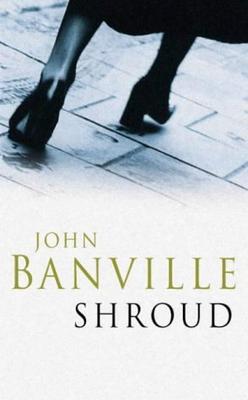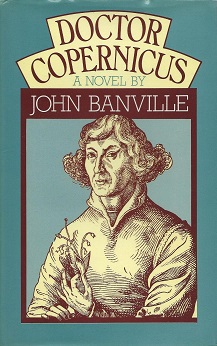
Nicolaus Copernicus was a Renaissance polymath, active as a mathematician, astronomer, and Catholic canon, who formulated a model of the universe that placed the Sun rather than Earth at its center. In all likelihood, Copernicus developed his model independently of Aristarchus of Samos, an ancient Greek astronomer who had formulated such a model some eighteen centuries earlier.

The first Irish prose fiction, in the form of legendary stories, appeared in the Irish language as early as the seventh century, along with chronicles and lives of saints in Irish and Latin. Such fiction was an adaptation and elaboration of earlier oral material and was the work of a learned class who had acquired literacy with the coming of Latin Christianity. A number of these stories were still available in manuscripts of the late medieval period and even as late as the nineteenth century, though poetry was by that time the main literary vehicle of the Irish language.

William John Banville is an Irish novelist, short story writer, adapter of dramas and screenwriter. Though he has been described as "the heir to Proust, via Nabokov", Banville himself maintains that W. B. Yeats and Henry James are the two real influences on his work.

The Sleepwalkers: A History of Man's Changing Vision of the Universe is a 1959 book by Arthur Koestler. It traces the history of Western cosmology from ancient Mesopotamia to Isaac Newton. He suggests that discoveries in science arise through a process akin to sleepwalking. Not that they arise by chance, but rather that scientists are neither fully aware of what guides their research, nor are they fully aware of the implications of what they discover.
The following lists events that happened during the year 2000 in Ireland.
Events from the year 1976 in Ireland.

Saturday (2005) is a novel by Ian McEwan. It is set in Fitzrovia, central London, on Saturday, 15 February 2003, as a large demonstration is taking place against the United States' 2003 invasion of Iraq. The protagonist, Henry Perowne, a 48-year-old neurosurgeon, has planned a series of errands and pleasures, culminating in a family dinner in the evening. As he goes about his day, he ponders the meaning of the protest and the problems that inspired it; however, the day is disrupted by an encounter with a violent, troubled man.

Samuel Baxter McIlroy is a Northern Irish retired footballer who played for Manchester United, Stoke City, Manchester City, Örgryte (Sweden), Bury, VfB Mödling (Austria), Preston North End and the Northern Ireland national team.

The Sea is a 2005 novel by John Banville. His fourteenth novel, it won the 2005 Booker Prize.

Rory Daniel McIlroy is a Northern Irish professional golfer who is a member of both the European Tour and the PGA Tour. He is a former world number one in the Official World Golf Ranking, and has spent over 100 weeks in that position during his career. He is a four-time major champion, winning the 2011 U.S. Open, 2012 PGA Championship, 2014 Open Championship and 2014 PGA Championship. Along with Jack Nicklaus and Tiger Woods, he is one of three players to win four majors by the age of 25.

Shroud is a 2002 novel by John Banville. It is the second book in the Alexander and Cass Cleave Trilogy, which also contains the novels Eclipse, published in 2000, and Ancient Light, published in 2012.
The Cinema of Northern Ireland is small. Traditionally the majority of films made in or about Northern Ireland have focused almost entirely on the Troubles; however, with the advent of peace since 1998, this is starting to change.
Eugene McCabe was a Scots-born Irish novelist, short story writer, playwright, and television screenwriter. John Banville said McCabe was "in the first rank of contemporary Irish novelists'.
Irish PEN Award for Literature is an annual literary award presented by Irish PEN since 1999. Its intent is to honour an Irish-born writer who has made an outstanding contribution to Irish literature. The award is for a significant body of work and is open to novelists, playwrights, poets, and scriptwriters.

The Newton Letter is a 1982 novella by John Banville. Drawing comparisons with Ford Madox Ford's The Good Soldier and John Hawkes's The Blood Oranges for their use of the unreliable narrator, The Newton Letter was described in The New York Times as Banville's "most impressive work to date". Colm Tóibín has stated that the book, among others by Banville, ought to have won the Booker Prize

Blue Nights is a memoir written by American author Joan Didion, first published in 2011. The memoir is an account of the death of Didion's daughter, Quintana, who died in 2005 at age 39. Didion also discusses her own feelings on parenthood and aging. The title refers to certain times in the "summer solstice [...] when the twilights turn long and blue." Blue Nights is notable for its "nihilistic" attitude towards grief as Didion offers little understanding or explanation of her daughter's death. Writing for The New York Review of Books, Cathleen Schine said,
"'We tell ourselves stories in order to live,' Didion famously wrote in The White Album. Blue Nights is about what happens when there are no more stories we can tell ourselves, no narrative to guide us and make sense out of the chaos, no order, no meaning, no conclusion to the tale."

The 2019 Open Championship was the 148th Open Championship, played 18–21 July at Royal Portrush Golf Club in County Antrim, Northern Ireland. It was the second Open Championship at Portrush, which last hosted in 1951, won by Max Faulkner. Royal Portrush saw major alterations in preparation for the tournament, including replacing two of the holes.

Mats Ulrik Malm is a Swedish literary writer and translator. On 18 October 2018, Malm was elected a member of the Swedish Academy, on 26 April 2019 he was elected the new Permanent Secretary and Speaker of the Swedish Academy.
John Banville is an Irish novelist, short story writer, adapter of dramas and screenwriter. He has won the Booker Prize, the James Tait Black Memorial Prize, the Franz Kafka Prize, the Austrian State Prize for European Literature and the Prince of Asturias Award for Literature; has been elected a Fellow of the Royal Society of Literature; knighted by Italy; is one of the most acclaimed writers in the English language.

John Banville: A Critical Study is a 1991 book by Joseph McMinn, which deals with the work of major turn of the century writer John Banville. It is part of Gill's Studies in Irish Literature series. McMinn claims to take a different approach to the "formalist" Rüdiger Imhof, who had until that time been the only other writer to treat of Banville's fiction.














